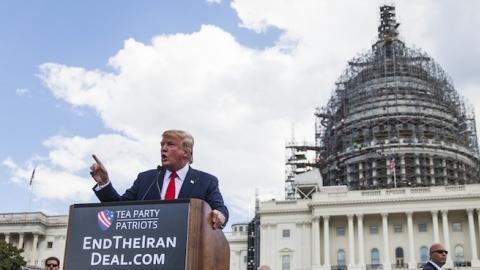Last week the Trump administration sent a letter to House speaker Paul Ryan to certify that the Islamic Republic of Iran is in compliance with the Joint Comprehensive Plan of Action, commonly referred to as the Iran nuclear deal. On the campaign trail, Donald Trump had called it the “worst deal ever negotiated" and promised it wouldn't stand if he made it to the White House. What gives?
Trump supporters and others who opposed Barack Obama's signature foreign policy initiative are now wondering: Was the president just bluffing? Did he plan all along to leave the deal in place and take his chances that Iran wouldn't go nuclear on his watch? As usual, Washington is abuzz that the administration is split into rival camps—one that wants to go hard on the Iranians and another that wants to take it easy on the leading state sponsor of terror.
There is indeed a conversation ongoing within the administration, the result of a larger, comprehensive review of Iran policy. According to one administration official, "it is one of the major projects that the government is now embarked on, involving hundreds, maybe thousands of people."
Numerous federal agencies are carrying out the review—including law enforcement and the intelligence community, the State Department and various embassies around the world, the Treasury Department, Justice, and the Pentagon. The process is being managed by National Security Council staff. The debate over Iran appears to be between those who want to cut them off at the knees and those who want to knock their block off, with arguments over exactly how badly and when.
Is Iran really in compliance with the nuclear deal? Probably not. As David Albright, founder of the Institute for Science and International Security, told The Weekly Standard's Jenna Lifhits last week, "Iran is either violating the deal, it's inconsistent with the deal, or it's just pushing the envelope."
By certifying that Iran is in compliance, the Trump White House simply complied with a legislative milestone, designed to keep the administration that brokered the agreement honest. Critics of the deal, eager for stronger action taken more quickly, should probably see certification not as a disappointment, but as a delay.
It does not signal, the Trump official told me, that this White House has concluded the JCPOA serves American interests. Rather, certification is a placeholder during the review process. It is buying time for the administration to muster its resources while it plans how to move forward on Iran. The Iranians might also see it as an opportunity—to get their act together lest they have to be reminded they are no longer dealing with President Obama.
In the last several weeks, the Trump White House has put a variety of Iran's cronies on notice. Vice President Mike Pence delivered a strong message to North Korea, with whom Iran cooperates on nuclear and ballistic missile technology, warning that the era of "strategic patience" is over. Secretary of State Rex Tillerson called out Russia, Iran's ally in Syria, and said it was either "incompetent" in failing to stop Bashar al-Assad's use of chemical weapons or "complicit." Most tellingly, Trump ordered a missile strike on the Syrian airfield that Assad, Iran's Arab ally and conduit to Hezbollah, had used to launch the sarin attack that killed at least 85 people.
Unlike the previous American president, the current one seems unworried about upsetting Tehran. If the mullahs decide to opt out of the deal they made on Obama's watch, so be it. This White House does not see Iran as a potential partner in regional stability, as a counterbalance to Saudi Arabia and Israel, as the Obama team did. Rather, it recognizes Iran is a very big problem, and the nuclear program is only one part of that problem. As Tillerson said last week, "We have to look at Iran in a very comprehensive way in terms of the threat it poses in all areas of the region and the world."
Much of the Iran policy review will rely on resources and capacities that the previous White House sidelined. For instance, Treasury may designate companies affiliated with Iran's Revolutionary Guard Corps for supporting terror or proliferation of weapons of mass destruction. That would freeze their assets and make it harder for other countries to do business with the designated firms. Says Mark Dubowitz, executive director of the Foundation for Defense of Democracies, which provided Treasury with a database of 800 IRGC companies yet to be designated, "Under the Obama administration, the White House prevented Treasury from designating IRGC entities. With the new administration, the pipeline is full and robust." In short, "the Trump administration is continuing to put Iran on notice."
Tehran has no doubt gotten the message. Whether that matters to a regime held together for nearly 40 years only by its anti-American animus is another question entirely.



















